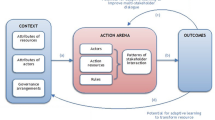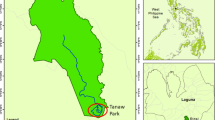Abstract
This paper assessed human–elephant conflict in the Okavango Delta Panhandle, Botswana, based on semi-structured interviews of the local residents. It further explores a sustainable alternative in which humans and elephants can co-exist. In 2019, the government of Botswana lifted the country’s 5-year hunting ban. It was a controversial policy change on the hunting moratorium. Many global conservationists argued that the change would have devastating effects on elephant populations in Africa. Local people lauded the decision as a way to protect their livelihoods. Assessment of people’s experiences is significant in identifying the socio-ecological landscape related to wildlife conservation. The data from this study are augmented by global media articles on human–elephant conflict. This paper employs a systems thinking approach in rethinking how human and elephants can co-exist and imagines the potential for a sustainable alternative through ecopedagogy.

Source: Sesinyi (2020)

Source: Author’s work, 2014. Courtesy of the Okavango Research Institute in Maun, Botswana

Source: Author’s work, 2021

Source: Author’s work, 2021

Source: Author’s work, 2021
Similar content being viewed by others
Availability of data and material
Not Applicable.
Code availability
Not Applicable.
Notes
Anthropocene is the geological epoch whereby human activity has been the dominant influence on climate and environment. https://vimeo.com/showcase/5632667/video/307080035 It is an era of marked human impact on the world.
1 USD is equivalent to 10.68 Botswana Pula (BWP). Retrieved from https://www.xe.com/currencyconverter/convert/?Amount=1&From=USD&To=BWP
The data that are presented in this paper emerged from the author’s Doctor of Philosophy (PhD) dissertation titled “The Integration of Environmental Education in the Secondary School Curriculum: A Case Study of a 10th Grade Junior Secondary School Curriculum in the Okavango Delta, Botswana”.
References
Antunes A, Gadotti M (2005) Ecopedagogy as the appropriate pedagogy to the earth charter process. https://1stdirectory.co.uk/_assets/files_comp/b93fbff0-096e-4fae-aa60-062716bfe524.pdf
Baaitse-Mmana F (2019) North west eagerly awaits hunting ban lift. The voice newspaper. Friday March 8. https://news.thevoicebw.com/north-west-eagerly-awaits-hunting-ban-lift/
Banerjee B [Session 1: A Complex Planet] (2018) December 6. System Acupuncture. Tackling Scaled and Complex Challenges. https://vimeo.com/showcase/5632667/video/307080035
BBC (2019) Botswana lift ban on elephant hunting. May 22. BBC NEWS. https://www.bbc.com/news/world-africa-48374880
Bernard T (2010) Hope and hard times. Communities, collaboration and sustainability. New Society Publishers, Canada
Blanc JJ, Barnes RFW, Craig GC, Dublin HT, Thouless CR, Douglas-Hamilton I, Hart JA (2007) African elephant status report 2007: An update from the African Elephant Database. Occasional Paper of the IUCN Species Survival Commission No. 33. https://portals.iucn.org/library/efiles/documents/SSC-OP-033.pdf
Bond J (2015) Making sense of human-elephant conflict in Laikipia Country, Kenya. Soc Nat Resour 283:312–327. https://doi.org/10.1080/08941920.2014.948238
Buchholtz E, Fitzgerald L, Songhurst A, McCulloch G, Stronza A (2019) Overlapping landscape utilization by elephants and people in the Western Okavango Panhandle: implications for conflict and conservation. Landscape Ecol 34:1411–1423. https://doi.org/10.1007/s10980-019-00856-1
Charles T (2018) Listen to the people of the Okavango. Mmegionline. August, 17. https://www.mmegi.bw/index.php?aid=77121&dir=2018/august/17
Charmaz K (2008) Grounded theory. In: Smith JA (ed) Qualitative psychology: a practical guide to research methods, 2nd edn. Sage, London, pp 81–110
Creswell JW (2013) Qualitative inquiry and research design: choosing among five approaches. Book News, Inc, Portland
de Greef K, Specia M (2019) Botswana Ends Ban on Elephant Hunting. The New York Times. https://www.nytimes.com/2019/05/23/world/africa/botswana-elephant-hunting.html
DeMotts R, Hoon P (2012) Whose elephants? conserving, compensating, and competing in northern botswana. Soc Nat Resour 25(9):837–851. https://doi.org/10.1080/08941920.2011.638362
Dormann CFB, Gruber B, Fründ J (2008) Introducing the bipartite package: analyzing ecological network. R News 8: 8 – 11. https://www.researchgate.net/publication/228861770_Introducing_the_bipartite_Package_Analysing_Ecological_Networks
Dube O (2020) Elephant mortality linked to Cyanobacteria. Botswana dailynews. September 21. Monday. http://www.dailynews.gov.bw/news-details.php?nid=58590
FAO (2015) Sustainable Wildlife Management and Human-Wildlife Conflict. 4 CPW Fact sheet. http://www.fao.org/3/a-i4893e.pdf
Forrester JW (1961) Industrial dynamics. Massachusetts Institute of Technology and Jon Wiley and Sons, New York
Forrester JW (1989) The Beginning of System Dynamics. Banquet Talk at the international meeting of the System Dynamics Society Stuttgart, Germany July 13 http://web.mit.edu/sysdyn/sd-intro/D-4165-1.pdf
Frank B, Bath A (2012) Does it matter where people live? Wildlife management across protected area boundaries. JSAMPA 1:12–21
Gaofise L (2019) Elephant talks today. Botswana daily newspaper. May 02, Thursday. http://www.dailynews.gov.bw/news-details.php?nid=49003
Gaoswediwe N (2019) Elephant hunting stabilises Ecological balance. Botswana daily newspaper. March 07, Thursday. http://www.dailynews.gov.bw/news-details.php?nid=47856
Gontse K, Mbaiwa JE, Thakadu OT (2018) Effects of wildlife crop raiding on the livelihoods of arable farmers in Khumaga, Boteti sub-district, Botswana. Dev South Afr 35(6):791–802. https://doi.org/10.1080/0376835X.2018.1495061
Guillemin M, Gillam L (2004) Ethics, reflexivity, and “ethnically important moments” in research. Qual Inq 10(2):261–280. https://doi.org/10.1177/1077800403262360
Hanahawano H, Mbambo O, Seronga M (2019) Elephants through the eyes of Seronga natives. https://www.mmegi.bw/index.php?aid=79956&dir=2019/march/08
International Trade Administration (2019) Botswana-Agricultural Sectors. Export.gov. https://www.export.gov/article?id=Botswana-Agricultural-Sectors
Karanth KK, Ranganathan P (2018) Assessing huma-wildlife interactions in a forest settlement in Sathyamangalam and Mudumalai tiger reserves. Trop Conserv Sci 11:1–14
Keaketswe K (2020) Department to establish cause of elephant deaths. Botswana dailynews paper. May, 17. http://www.dailynews.gov.bw/news-details.php?nid=56232
Kopnina H (2020) Education for the future? Critical evaluation of education for sustainable development goals. J Environ Educ 51(4):280–291. https://doi.org/10.1080/00958964.2019.1710444
Koro E (2019) At the mercy of an angry giant. Mmegi. 36(18) 10 May 2019, Friday. https://www.mmegi.bw/features/at-the-mercy-of-an-angry-giant/news
Leithead A (2019) Botswana elephant poaching 'no hoax'. BBCNEWS BOTSWANA, 25 February. https://www.bbc.com/news/world-africa-47321241
Madzwamuse M, Rihoy L (2019) Upholding democracy, human rights and conservation. Mmegi 01 March. 36(08)
Mbaiwa JE (2017) Effects of the safari hunting tourism ban on rural livelihoods and wildlife conservation in northern Botswana. South Afr Geogr J 100(1):41–61
Mbaiwa JE (2018) Human-Wildlife conflicts in the Okavango Delta, Botswana: what are sustainable management options? PULA: Botswana Journal of African Studies. 32 (1), 22–35. https://journals.ub.bw/index.php/pula/article/view/1524
McNutt JW, Stein AB, McNutt LB et al (2017) Living on the edge: characteristics of human-wildlife conflict in a traditional livestock community in Botswana. Wildlife Research. CSIRO publishing, Australia. https://doi.org/10.1071/WR16160
Mguni M (2019) Elephant hunting raffles for Batswana kick off. Mmegionline. http://www.mmegi.bw/index.php?aid=82814&dir=2019/september/20
Mmegi (2019) Botswana lifts ban on elephant hunting. Mmegionline. https://www.mmegi.bw/index.php?aid=81018&dir=2019/may/22
Okavango Research Institute (2019) The big elephant debate. Botswana Guardian. March 8
Onishi N (2015) A hunting ban saps a village’s livelihood. September 12. New York Times. A6. https://www.nytimes.com/2015/09/13/world/a-hunting-ban-saps-a-villages-livelihood.html.
Onwuegbuzie AJ, Frels R (2016) Seven steps to a comprehensive literature review. A multimodal and cultural approach, 1st edn. Sage publications, Los Angeles
Parker G, Osborn, F, Hoare R et al (2007) Human-elephant conflict mitigation: a training course for community-based approaches in Africa. Trainers’ Manual. https://www.iucn.org/sites/dev/files/import/downloads/heccombaptmen.pdf
Patana P, Mawengkang H, Lydia MS (2018) Conceptual model for mitigating human – Wildlife conflict based on system thinking. In: IOP Conf. Series: Materials Science and Engineering 300 (2018) 012052. https://doi.org/10.1088/1757-899X/300/1/012052
Patton MQ (2015) Qualitative research & evaluation methods, 4th edn. Sage publications, Thousand Oaks, CA
Pozo RA, Coulson T, McCulloch G et al (2017) Determining baselines for human-elephant conflict: a matter of time. PLoS ONE 12(6):e0178840. https://doi.org/10.1371/journal.pone.0178840
Princen T (2010) Treading softly. Paths to ecological order. The MIT Press, Cambridge, USA
Republic of Botswana (2012) Agriculture and Food Security Policy Brief. Reflecting on the challenges of Attaining a Green Economy for Botswana. https://sustainabledevelopment.un.org/content/documents/1008National%20Report%20(Agriculture)%20-%20Botswana.pdf
Republic of Botswana (2019) Media Invitation – Pres Conference- Lifting of the hunting suspension in Botswana. May 22. https://twitter.com/bwgovernment/status/1131466639294291969
Rubin HJ, Rubin IS (2012) Qualitative interviewing: The art of hearing data, 3rd edn. Sage publications, Thousand Oaks, CA
Sesinyi B (2020) Elephants crossing a gravel road in the Okavango Delta panhandle. Okavango Delta, Botswana
Shaffer JL, Khadka KK, Van Den Hoek J et al (2019) Human-elephant conflict: a review of current management strategies and future directions. Front Ecol Evol 6:235. https://doi.org/10.3389/fevo.2018.00235
Sibanda A (2019) Masisi receives hunting report. Botswana Daily News. http://www.dailynews.gov.bw/news-details.php?nid=47489
Songhurst A, McCollouch G, Coulson T (2016) Finding pathways to human-elephant co-existence: a risky business. Oryx 50(4):713–720. https://doi.org/10.1017/S0030605315000344
Stake ER (1995) The art of case study research. Sage publications, Thousand Oaks, CA
Statistics Botswana (2016) Botswana in figures 2016. http://www.statsbots.org.bw/sites/default/files/publications/Botswana%20in%20Figures%202017.pdf
Stone MT, Nyaupane GP (2018) Protected areas, wildlife-based community tourism and community livelihoods dynamics: spiraling up and down of community capitals. J Sustain Tour 26(2):307–324. https://doi.org/10.1080/09669582.2017.1349774
Sunday Standard Reporter (2019) Lift hunting ban, cull elephants-cabinet sub committee recommends. SUNDAY STANDARD. http://www.sundaystandard.info/lift-hunting-ban-cull-elephants-cabinet-sub-committee-recommends
Sweeney LB, Meadows D (2010) The systems thinking playbook: exercises to stretch and build learning and systems thinking capabilities. Chelsea Green Publishing, Vermont
Sweeney LB [Session 1: A Complex Planet]. (2018, December 6) Seeing Beyond the Obvious: Wired to connect, trained to fragment, and what we can do about it. Accessed https://vimeo.com/showcase/5632667/video/306840558
Tawana Land Board (2006) Okavango delta ramsar site land use and land management plan (2005–2029). Final Report. Ngamiland District Land Use Planning unit. Department of Environmental Affairs
The Guardian (2019) Botswana condemned for lifting ban on hunting elephants. May 23. The Guardian. https://www.theguardian.com/world/2019/may/23/botswana-lifts-ban-on-hunting-elephants
The Patriot on Sunday (2019) Elephant hunting divides opinion. August 11. The Patriot on Sunday
The World Bank (2018) A changing world population. https://datatopics.worldbank.org/world-development-indicators/stories/a-changing-world-population.html
Thouless CR, Dublin HT, Blanc JJ, Skinner DP, Daniel TE, Taylor RD, Maisels F, Frederick HL, Bouche P (2016) African Elephant Status Report 2016: an update from the African Elephant Database. Occasional Paper Series of the IUCN Species Survival Commission, No. 60 IUCN / SSC Africa Elephant Specialist Group. IUCN, Gland, Switzerland. https://portals.iucn.org/library/sites/library/files/documents/SSC-OP-060_A.pdf
Verreynne FJE (2018) Botswana elephant poaching debate. Wildlife vet speaks his mind. Africa Geographic. https://africageographic.com/blog/botswana-elephant-poaching-debate-wildlife-vet-speaks-mind/
Yurco K, King B, Young K, Crews KA (2017) Human-wildlife interactions and environmental dynamics in the Okavango Delta. Botsw Soc Nat Resour 30(9):1112–1126
Acknowledgements
The author would like to recognize insights provided by all participants. They provided their time and energy during field work. Professor Bruce Martin, from the department of Recreation and Sport Pedagogy at Ohio University, played an important role in reading the draft of this manuscript.
Funding
This work was funded by The Patton College of Education (IRB 14E121) at Ohio University in USA and supported by the Government of Botswana (Reference EWT/36/14XXVI(94).
Author information
Authors and Affiliations
Corresponding author
Ethics declarations
Conflict of interest
No potential conflict of interest was reported by the author.
Additional information
Publisher's Note
Springer Nature remains neutral with regard to jurisdictional claims in published maps and institutional affiliations.
Rights and permissions
About this article
Cite this article
Velempini, K. About the human–elephant conflict in Botswana, what did people in the Okavango Delta panhandle have to say from their experience?. Socio Ecol Pract Res 3, 411–425 (2021). https://doi.org/10.1007/s42532-021-00100-8
Received:
Accepted:
Published:
Issue Date:
DOI: https://doi.org/10.1007/s42532-021-00100-8




